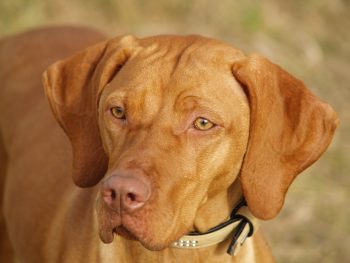Vizslas, renowned for their affectionate nature and high energy levels, are a breed that enjoys their meals enthusiastically. When a Vizsla loses interest in food, it can be a cause for concern for any pet owner. Understanding why your Vizsla might not be eating is essential for ensuring their health and well-being. This article explores the common reasons for losing appetite in Vizslas and guides on when it is crucial to seek veterinary care.
Understanding the Vizsla’s Dietary Needs
Before diving into why a Vizsla may not be eating, it’s essential to understand their specific dietary needs. Vizslas are active dogs requiring a balanced diet of protein and nutrients to support their energy levels. They typically do well on high-quality commercial dog foods or well-planned home-cooked diets. Knowing what is normal for your Vizsla can help you better identify when their eating habits change.
Common Reasons for Loss of Appetite in Vizslas
Dietary Changes and Sensitivities
A sudden change in diet can disrupt a Vizsla’s appetite. These dogs may also develop sensitivities or allergies to certain food ingredients, leading to gastrointestinal upset and a subsequent loss of appetite. Introducing new foods gradually and being aware of any signs of food intolerance or allergies is essential.
Environmental and Emotional Factors
Vizslas are sensitive dogs, and their environment or routine changes can impact their eating habits. Stressful events like moving houses, adding a new pet, or changing the family dynamic can cause a temporary loss of appetite. Providing a stable and comforting environment is vital in helping them adjust.
Dental Problems and Oral Discomfort
Like many breeds, Vizslas can suffer from dental issues such as tooth decay or gum disease, making eating painful. Regular dental check-ups and cleanings are crucial to prevent and address any oral health problems affecting their appetite.
Underlying Health Issues
Sometimes, a loss of appetite in a Vizsla can indicate a more severe health issue, such as infections, gastrointestinal problems, or other systemic illnesses. It’s essential to observe your dog for other symptoms and consult a veterinarian if the loss of appetite persists or is accompanied by other signs of disease.
When to Take Your Vizsla to the Vet
Persistent Loss of Appetite
If your Vizsla refuses food for more than 24 hours, it warrants a visit to the vet. A prolonged loss of appetite can lead to nutritional deficiencies and other health complications, especially in a high-energy breed like the Vizsla.
Accompanying Symptoms of Concern
Be vigilant for symptoms like vomiting, diarrhea, lethargy, significant changes in drinking habits, and loss of appetite. These symptoms can indicate a severe condition requiring immediate veterinary attention.
Behavioral Changes
Any significant change in your Vizsla’s behavior and not eating should prompt a vet visit. Signs of depression, increased aggression, or lethargy can be indicators of underlying health issues.
Noticeable Weight Loss
Weight loss in a Vizsla, especially if rapid or severe, is a cause for concern and should be evaluated by a veterinarian. Weight loss can be a symptom of various underlying conditions, some of which may require immediate treatment.
A loss of appetite in a Vizsla can be concerning, but often, the cause is manageable or temporary. Understanding their typical eating habits, identifying common reasons for a decreased appetite, and knowing when to seek veterinary assistance are crucial steps in caring for your Vizsla. Regular health check-ups, a balanced diet, and a stable, loving environment are fundamental to keeping your Vizsla healthy and happy. Remember, each dog is unique, and what might be a minor issue for one could be more severe for another. Always err on caution and consult your veterinarian if you are concerned.
Tips for Getting Your Vizsla to Eat
The post Why is My Vizsla Not Eating? appeared first on iHeartDogs.com.

